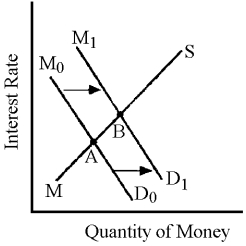Exam 16: Budget Deficits in the Short and Long Run
Exam 1: What Is Economics?227 Questions
Exam 2: The Economy: Myth and Reality150 Questions
Exam 3: The Fundamental Economic Problem: Scarcity and Choice250 Questions
Exam 4: Supply and Demand: An Initial Look308 Questions
Exam 5: An Introduction to Macroeconomics211 Questions
Exam 6: The Goals of Macroeconomic Policy207 Questions
Exam 7: Economic Growth: Theory and Policy223 Questions
Exam 8: Aggregate Demand and the Powerful Consumer214 Questions
Exam 9: Demand-Side Equilibrium: Unemployment or Inflation?211 Questions
Exam 10: Bringing in the Supply Side: Unemployment and Inflation?223 Questions
Exam 11: Managing Aggregate Demand: Fiscal Policy205 Questions
Exam 12: Money and the Banking System219 Questions
Exam 13: Monetary Policy: Conventional and Unconventional205 Questions
Exam 14: The Financial Crisis and the Great Recession61 Questions
Exam 15: The Debate over Monetary and Fiscal Policy214 Questions
Exam 16: Budget Deficits in the Short and Long Run210 Questions
Exam 17: The Trade Off between Inflation and Unemployment214 Questions
Exam 18: International Trade and Comparative Advantage226 Questions
Exam 19: The International Monetary System: Order or Disorder?213 Questions
Exam 20: Exchange Rates and the Macroeconomy214 Questions
Select questions type
Many economists believe that if fiscal policy turns contractionary to reduce the deficit,
(Multiple Choice)
4.9/5  (36)
(36)
E.Carey Brown,an MIT economist,studied government deficits during the Great Depression and found that even though actual deficits were large,the structural deficit changed very little.Which of the following statements is consistent with this finding?
(Multiple Choice)
4.8/5  (35)
(35)
The principal difference between conventional accounting and economic analysis of inflation is that
(Multiple Choice)
4.8/5  (35)
(35)
The share of the net national debt owned by foreign individuals,businesses,and governments increased to 80% in 2010.
(True/False)
4.9/5  (37)
(37)
Appropriate fiscal policy depends on the other major tool of governmental stabilization policy:
(Multiple Choice)
4.7/5  (32)
(32)
Although a balanced budget may be appropriate under one monetary policy,a deficit or surplus may be appropriate under a different monetary policy.
(True/False)
4.7/5  (38)
(38)
A budget deficit will be most inflationary if the aggregate
(Multiple Choice)
4.8/5  (37)
(37)
Economic principles suggest that we should focus on balancing the budget rather than balancing aggregate supply and aggregate demand.
(True/False)
4.8/5  (47)
(47)
"Budget deficits are inflationary." The truth of this statement depends on
(Multiple Choice)
4.8/5  (31)
(31)
What does it mean to "monetize the deficit"? Why is it important in discussions of fiscal policy? Use an appropriate diagram to illustrate your answer.
(Short Answer)
4.7/5  (40)
(40)
The structural deficit is determined by established expenditure-transfer policies and tax rates and is independent of the current level of GDP.
(True/False)
4.7/5  (28)
(28)
How sensitive is the structural deficit to the state of the economy?
(Multiple Choice)
4.8/5  (43)
(43)
In 2009,the Social Security System ran a surplus of approximately $137 billion.
(True/False)
4.7/5  (36)
(36)
Figure 16-3
 -If budget deficits shift the money demand curve as is illustrated in Figure 16-3,which component of total expenditures will be affected the most?
-If budget deficits shift the money demand curve as is illustrated in Figure 16-3,which component of total expenditures will be affected the most?
(Multiple Choice)
4.9/5  (36)
(36)
When the economy has substantial additional saving,deficit spending will have a large "crowding out" effect.
(True/False)
4.8/5  (37)
(37)
Showing 61 - 80 of 210
Filters
- Essay(0)
- Multiple Choice(0)
- Short Answer(0)
- True False(0)
- Matching(0)